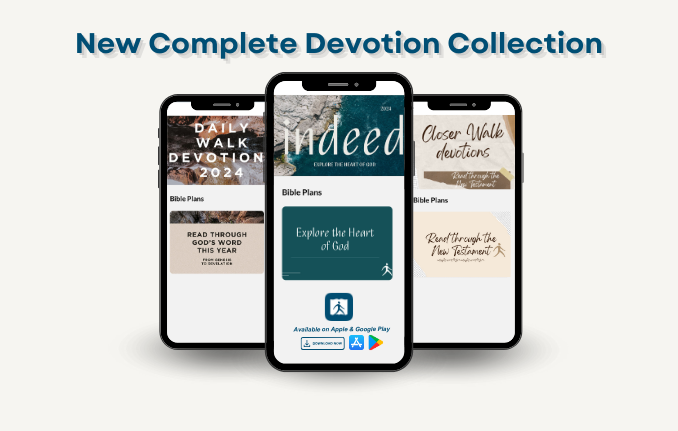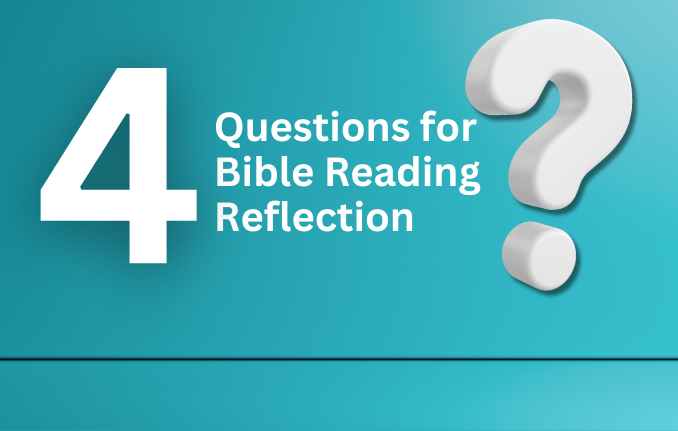
Daily Devotions – Complete Collection




Establishing new habits is difficult.
It is that time of year where we are thinking about new habits. It’s no secret that starting a new
behavior is a lot easier than sustaining it as a new habit. Take exercise, for instance. I’m not
sure how many times I’ve started some new commitment to get back in shape. I’ve done all
kinds of things to convince myself that it will stick this time. Things like buy new equipment.
Download a new app. Read advice from experts. Sign-up for a new membership. It doesn’t take
much to immediately go all in.
At least for a while.
And then the zeal begins to fade. Consistency declines. Excuses begin. Equipment gathers dust.
Memberships are unused. Apps are unopened. Before long the new habit becomes nothing
more than another failed attempt at change.
Sound familiar? I suspect it does to many of us.
Unfortunately, developing a new habit for Bible reading is not immune to the same sad roller
coaster of ups and downs or starts and stops. For many of us, it happens every January. The
new year seems like a good time to start a “read through the Bible in a year” plan. But by the
time the Israelites are wandering in the wilderness, many of us lose interest, get busy, or are
simply too distracted.
The hard reality is that many people who start a new Bible reading journey won’t stick with it.
What would it take to turn our commitment to read the Bible into something more than just
another forgotten resolution? How do we get over the hump of moving this journey from a
desire into a lasting habit?
What follows are four suggestions that may just help your new Bible reading resolution stick this
year.
Community is a powerful thing, especially in developing new behaviors. The fitness industry has
certainly realized this. There are apps where you can share your workouts and your progress to
get the encouragement from your network. Gyms have successfully built themselves around a
community of people enduring the pain of the workout together. Even exercise equipment
manufacturers have tapped into the power of community through connecting users’ online
experiences as people exercise from their home.
While Bible reading is often thought about as an individual discipline, what if we leveraged the
power of community to help us stick with our Bible reading resolution this year?
This could be as simple as finding a few friends to follow along on the same reading plan,
getting together weekly to discuss what you have read, or even sending a quick text message
for accountability—these things and more invite others to help make Bible-reading a habit that
sticks.
We know there is power in community to do hard things. Applying that principle to your Bible
reading may just be the most helpful thing to build consistency this year.
The Bible is a big book. It will vary based on the translation you are reading, but there are
approximately 750,000 words in the Bible. By contrast, the average novel may only be between
60,000-90,000 words. Reading the Bible is a far bigger undertaking than breezing through your
favorite fiction author. While you can read through the entire Bible in a year by just reading
about 15 minutes a day, it is a big commitment to read the entire Bible.
I’m not much of a runner these days, but in my younger years I ran quite a bit. I loved running
longer races; I was not fast in short distances. Running a marathon is completely different than
running a sprint.
Perhaps it is helpful to think about reading the Bible more like running a marathon than a 100-
yard dash. This means that a slow, consistent pace may very helpful—especially as you are
beginning a new Bible-reading resolution.
It is okay to start small. Get a Bible reading schedule that will serve as a guide to read 15-20
minutes a day. Set a manageable goal as you get started so you are more likely to build on your
success rather than get frustrated because you couldn’t keep up the pace.
When I think about failed attempts to start a new exercise routine in my own life, there is
another problem that has plagued me: I get bored. For instance, after a few days or weeks of
running, especially if it is the same route over and over, I get tired of the monotony of it.
I have found that this can be true of Bible reading as well. Especially if we are following a Bible
reading plan, our reading can become something of a mundane task that we feel obligated to
just get done every day rather than to experience the joy and wonder of reading God’s Word.
If you are starting to feel stuck by the repetition of reading the Bible, then why not change up
how you are experiencing the Bible?
There are great (and free) ways to listen to the Bible, such as Walk Thru the Bible’s Daily Walk
Podcast.
Read the Bible with your family or with friends by taking turns reading a chapter aloud to each other. If you are in the portion of the reading plan where you are reading some of the more challenging parts of the Old Testament, like Leviticus or Numbers, simply take a break and read the Psalms or one of the Gospels for a few days.
There is no magic formula or prescribed methodology that is required for reading the Bible. If
you find yourself getting stuck, mix things up to do something to stay consistent and faithful in
your Bible reading resolution.
Depending on what research you read, anywhere from 80-95% of people will fail to keep their
New Year’s resolutions, usually by February! It is amazing that we keep making those
resolutions—sometimes the same ones, year after year—knowing we probably won’t keep
them.
There is no reason to think that resolutions are kept longer simply because they are spiritual
ones, like reading the Bible. Sadly, most people who decide to read the Bible in the new year
won’t make it all the way through. And many won’t make it very far.
The reasons are varied. For some, reading some of the books in the Old Testament can get
confusing and overwhelming. Others find that their schedules get busy and Bible reading isn’t a
priority. Sometimes our schedules change and the time we planned to do our Bible reading
gets overrun with work obligations, kids’ activities, or other commitments.
I’ve heard Bible reading advice that suggests we should find the same time every day to read
our Bibles. If your schedule is anything like mine, it is nearly impossible to find a time that
works every day because each day’s schedule can be quite different.
There are a lot of things that have the potential to interrupt your Bible reading and get you off
track. And unfortunately, once we fall off track it is hard—sometimes very hard—to get started
again.
What can we do if find ourselves falling behind on our new Bible reading commitment?
Maybe it sounds too simple, but simply jump back in there. If you missed a few days in your
Bible reading plan, you can make it up over time. Ask someone to help hold you accountable to
getting started again. On your commute, listen to an audio Bible for some of the days you
missed to help you get caught up. And just know that you are in good company with lots of
people who are facing the same struggles.
Bottom line: just get going again.
Your decision to read the Bible in 2024 may have the biggest impact on your life this year. The
Bible is living and active (Hebrews 4:12). It is God’s Word to you to help transform you into the
person God desires you to be. Reading the Bible will change you this year … and in the coming
years.
My hope for you is that you experience the joy and power of God’s Word in your life this year. If
you are already struggling to be consistent, then I hope you will keep at it. And if you haven’t
started, know that it is never too late to get going!
***
Michael Gunnin
Executive VP & Chief Growth Officer

When life gets busy and schedules get chaotic, does Bible reading reflection sometimes feel like another thing you’ve got to get done? It’s really easy for reading the Bible to just become part of a checklist. But, when we’re rushing to “get it done and checked off the list,” we’re not really creating moments for God’s Word to speak to our hearts and go deep in our lives.

Reading the Scriptures can be overwhelming, whether we’re a seasoned Bible reader or we’re just getting started. While the Bible is a big and complex book, the Scriptures are designed to be accessible to all of us!
I hope you are ready to jump in, or continue, your Bible reading in the new year. As you begin your Bible reading for 2024, here are 4 tips to help maximize your reading of the Scripture.
Tip #1: Read your Bible big
Most of the books we read are different from most Bibles. Take a book from your bookshelf or book stack, open it, and compare it to the Bible. Publishers usually print the majority of Bibles with two columns of text on each page There are numbers everywhere—big numbers that are for chapters and small numbers that are verses. Your favorite novel doesn’t have all those markings.
The history of Bible publishing and how we got our modern Bible is fascinating and revealing. The modern Bible offers a very different experience than when they originally wrote it. For example, a messenger delivered the apostle Paul’s writings as letters on parchment. A group of people probably gathered to listen as someone read the letters out loud. There were no book titles. No chapters, no verses, no footnotes, no section headings, no study notes, no commentary, no leather covers… It was just a letter.
We’ve added a lot since then, especially in recent years.
Stephen Langton, Archbishop of Canterbury, did not add chapters to the Bible until the 13th century. He was writing a commentary and used chapter numbers pragmatically as a way of finding things in his reference work. Scholars added verses some 300 years later in the 16th century, again as a pragmatic tool. In the history of the Bible, these are relatively modern features.
Since then, we’ve added a lot of other features: section headings, red letters, commentary. Bible publishers have been marketing the Bible in ways that grab our interests. They do this with specialty Bibles that have supplemental materials just for the niche reader.
None of that is necessarily bad, but some Bible scholars are conflicted. How has our modern Bible has changed the way we read it?
One of the consequences of things we’ve added to the Bible is that we read in small, bite-sized bits. We read a verse here and a verse there. Section headings train our eyes to stop. This creates breaks in the text that the author may have never intended. We tend to read small sections of the Bible that correspond to a devotional guide or a Bible reading plan.
The intention of these comments is not to be critical. Walk Thru the Bible publishes Bible reading plans and devotional guides and Bibles to help you read through God’s Word.
However, we tend to read small—a few verses, maybe a section, perhaps a chapter. In reading small, we miss a lot. We miss the grand storyline of a book. Or the broader contexts of what we are reading. And the opportunity to get lost in the beauty of the Bible the way we might as if we are curling up with our favorite novel. The Bible becomes a checklist to get done rather than a story to be mesmerized with.
As you read the Bible this year, I encourage you to try something new: read big!
Bigness refers to the amount of Bible we are reading. Find time to sit down and read large portions of the Bible. Don’t read verses or sections or even chapters. Read entire books at a time. Carve out some time and read a Gospel in one sitting. Read Paul’s letters as if you had just gotten a letter from a friend. You wouldn’t put down their letter until you are finished. Or read the entire book of Ruth at one time.
It may not be practical for you do that every day. But can you find time once a week to read big? When we read complete books or movements in the Bible, we will hear and experience and love this book in different ways that invite us to truly engage with God’s Word.
Tip #2: Read your Bible in community
How good are you at keeping New Year’s resolutions? If you are like the rest of us, then you’re probably not great at them either. The majority of Resolutions made in the New Year are not kept. For many of us, they only last a few weeks. Sometimes it is just a few days.
A lot of Christians started the new year with a big dream of reading the Bible more. This may be daily or all the way through.
And for all of our good intentions, sticking with it is hard.
One of the best ways to stick with our Bible reading commitment is to read in community.
We find support systems for all sorts of new behaviors instead of going at it alone. Groups and support systems serve as a motivation and, most importantly, as accountability to stick with those new commitments. We know that motivation and accountability are important. That will increase the likelihood that we stick with hard things, especially when we don’t do them alone.
Why should Bible reading be any different? Why do we think we have to do this alone?
If we know we need some accountability and community to exercise and eat healthy and lose weight, what if we found accountability and community to read the Bible this year?
Finding a small group of people and reading on the same Bible reading schedule is a powerful motivation. You are able to hold each other accountable by discussing what you are reading together.
Walk Thru even has a Daily Walk 2024 Facebook group to learn & grow together with people all around the world- join today!
Tip #3: Pray the Scriptures
What is the most unusual thing you’ve ever had on your Christmas list? When my oldest son was around 5 years old, he added a bag of dirt as a last-minute addition to his list. He wanted some dirt to build a track for his toy trucks, so we made sure he unwrapped some dirt on Christmas morning. However, we did get some strange looks when he told people what was on his Christmas list!
As a Christ follower, I wonder sometimes how God views the kinds of requests that we make in prayer. Do my prayers sound like a spoiled kid who asks for and expects everything? Or do they sound like random requests like asking for a bag of dirt for Christmas?
“If you remain in Me and My words remain in you, ask whatever you wish, and it will be done for you.” Jesus says in John 15:7.
Our attention is usually drawn to the last part of that verse; ask whatever you wish and it will be done for you. What a remarkable promise! But Jesus qualifies that with an often overlooked “if”—if you remain in Me and My words remain in you.
How do we pray asking God what we wish for but doing so knowing that God’s Word has remained in us? The answer to this question is why I think it is important to pray the Scripture. Which is the third tip to maximize your Bible reading in the new year.
Praying the Scriptures is a longstanding discipline of using the Bible as our guide in prayer. As you read the Bible, pause and pray back to God the ideas or even the words you’ve read. It may be a prayer of thanksgiving as the Bible reminds us of God’s goodness in our life. Or it could convict us when we’ve read something; or it may request a prayer of confession.
Praying the Scriptures often requires a slow and deliberate reading of the Bible. However, it is one of the most effective ways to align our prayers with God’s will and God’s Word. If you’ve not been praying your way through the Bible, try experiencing the Scriptures through the lens of prayer in the new year.
Tip #4: Listen instead of read
There is an interesting, and perhaps too easily overlooked, instruction in 1 Timothy 4:13, “Until I come, devote yourself to the public reading of Scripture, to preaching and teaching.”
Most of us, especially in the west, have unlimited access to the Bible. From a copy of the Scriptures that we have in our homes or simply opening an app on our phone or even listening through the Word, we have the remarkable privilege of reading the Bible for ourselves.
The early church transmitted the Bible largely through public reading. During the first century, people in the Greco Roman world commonly shared literature through public reading events. The early church, two thousand years ago, hand wrote printed copies and used digital media.
Listening to the Bible is one way to add variety in our Bible reading and experience the Bible in a different way. This will allow us to return to how God’s Word was received for most early believers.
Listening to the Bible allows us to experience the Bible in new, different ways than when we read. If you’ve been reading the Bible, think about occasionally replacing or adding listening to the voice of God in His Word. There are great audio Bibles, podcasts (including Walk Thru the Bible’s Daily Walk Podcast), and mobile phone apps that will help you listen to the Bible.
The Bible changes everything—and we hope you give it a chance this year to change you.
***
by Michael Gunnin, Walk Thru the Bible’s Chief Growth Officer


Yet, it’s no secret that most of our best intentions don’t result in lasting change. Researchers vary on how long New Year’s resolutions will last, but it’s not promising. We all know it – resolutions usually don’t stick. Strava—the fitness app that is popular with cyclists and runners—deemed January 19 as “quitters day” because 19 days into the new year was when most people quit their new exercise commitments.
The desire to do something new in the new year isn’t enough for most people to stick with it.
The same is true of Bible reading. The beginning of a new year often stirs a desire within us to read through the Bible. There is no shortage of Bible reading plans that can guide you from Genesis to Revelation over the next 12 months. But more than a few of us who have wanted to read through the Bible in the new year never made it out of Genesis, or we got lost with the Israelites in the wilderness, or we got bogged down in the regulations in Leviticus.
For lots of would-be Bible readers who set out to read the Bible through in a year, one of the major reasons people give up Is the struggle to find time for daily Bible reading.
Bible reading commitments get squeezed out by all the other stuff that fills our days. Unfortunately, the new year doesn’t come with any extra minutes in the day. To find time to read the Bible, we are going to have fit it into what is probably already a schedule that is too full.
But how? How can we do it? How can we find time to read through the Bible? Here are three practical suggestions.
My 11-year-old son often asks my wife to read the Bible to him in the evening. We love that he wants to hear the Bible! But after school, homework, sports practices, and dinner, finding time to read the Bible was becoming a challenge. So, my wife found a creative, yet somewhat comical solution. After he gets in the shower, she goes in the bathroom, closes the lid to the toilet, and sits there and reads the Bible to him while he shampoos his hair. He has heard a lot of New Testament this past year from behind a shower curtain!
Maybe bathroom Bible reading isn’t your thing, but where can you repurpose some time to find Bible reading opportunities? There are great audio Bible options to listen to the Bible during your commute or while driving kids to school and activities. Can you read the Bible as you eat your breakfast or lunch? We all spend lots of time waiting—waiting for the doctor, waiting for a hair appointment, waiting for meetings, waiting for flights, waiting in pick-up lines at our kids’ schools, and more. What if we used this waiting time to read the Bible in the new year?
Time is the great equalizer. None of us can create more of it. We all have the same amount each day. But it is our choice as to how we spend our time. Why not be more intentional this year about using some of that time to read the Bible in the new year?
Some researchers suggest we spend on average more than two hours on social media sites every day. While at first that may not seem possible, 15 minutes scrolling aimlessly a few times a day can really add up. When you add in any time spent watching TV or time spent playing a game on your phone, this can be a lot of minutes that are simply lost. Most of us could easily sacrifice some time we spend on technology to use time in more productive ways.
Try making an appointment with yourself to read the Bible. Add it to your calendar. Or set an alarm at the same time every day. Treat that appointment or alarm like you would any other important meeting in your day. When we turn off the phone, shut out distractions, quiet the noise of daily life, we can focus on the most important thing in that moment—and that is spending time with our heavenly Father and His Word.
Finding time to read the Bible may not as complicated as we think. If you are looking for time to read the Bible in 2024, it may be a simple as just trimming those time wasters.
The Bible can seem daunting, overwhelming to read—especially if we are trying to read all of it. However, for most readers, it only takes 12-15 minutes per day to read the entire Bible in one year. Think about that…just 15 minutes a day and you could read through the Bible every year!
Making a seemingly small sacrifice may be all that is needed to find time to read through the Bible in 2024. Setting your alarm to wake up 15 minutes earlier or reading for 15 minutes before you go to bed or listening to the Bible on your commute is a small sacrifice. Yet this may be all that’s needed to read the whole Bible this year.
Where can you make a small sacrifice to find 15 minutes each day to read your Bible this year? We all get 1,440 minutes a day, each day. Making sure we spend 15 of them to hear from God seems like a wise choice in this new year.
When I’ve talked to people about why they don’t read the Bible, finding time to do it is an often-cited reason. And I get it. Our schedules are full. Our days are long. And the thought of trying to squeeze one more thing into our 24 hours just feels overwhelming. However, an intentional decision to be purposeful with our time—even just 15 minutes a day—means you could read the entire Bible in a year.
And that decision might be the most important thing you choose to do.
***
by Michael Gunnin
Walk Thru the Bible’s Chief Growth Officer


Reading through the Bible will help you grow in your faith, in your relationship with God, in your journey with Jesus. An intentional plan will help you get into the regular rhythm of meeting with God every day, studying His Word, hearing His voice, and drawing closer to Him.
As you meet with God and read your Bible each day, your life will change. You will begin to love as Jesus loves. You will begin to see others through His eyes. You will view this broken world in a new way. You will begin to walk closer with Him, and so much more.
Because the Bible changes everything.
And it’s never too late to start reading.
If your New Year’s resolution is to read through the Bible in 2023, we can help! We have Bible reading plans, the Daily Walk Podcast, the Daily Walk Bible, and others tools and resources to help you stay on track. Maybe you resolved to read through the Bible this year. Maybe you’ve gotten stuck. Maybe you’ve read stories that you don’t understand.
At Walk Thru the Bible, we can help.
The Daily Walk Devotional Podcast will help you listen through the Bible in one year. Each day’s episode features a devotional thought and a guided journey through that day’s reading of Scripture.
The Daily Walk Reading Plan is a free, Bible reading plan that will help you read through the entire Bible in one year.
The New Testament Reading Plan will help you read through the New Testament twice in a year.
The Chronological Reading Plan will take you through the Bible’s grand story, the big story, so that you follow the storyline chronologically. This way you won’t get stuck in certain sections. Instead, it helps you see the big picture and how the Bible fits together.
The Daily Walk Bible offers a simple daily reading plan and tools to help you complete the journey of reading through the Bible in one year. It’s a tool you will find many ways to use—and a tool that God can use in many ways in your life. Each day’s reading has an OVERVIEW that provides a bird’s-eye view of your Bible reading walk for the day; a MY DAILY WALK section that encourages you to think carefully about and apply one scriptural insight from the day’s reading; and an INSIGHTS section that offers interesting facts about the day’s passage to help build your Bible knowledge.
We even have a Facebook group you can join to build community as we walk through Scripture together!
Don’t feel discouraged if you fall behind in your reading plan. Remember, the beauty of reading the Bible is getting to know the Lover of your soul, hearing His voice, and learning His ways.


KINGDOM TRUTH #4: IF YOU WANT TO KNOW WHAT GOD IS LIKE, LOOK AT JESUS AND SEE GOD UNVEILED.
It had been a long, long time to be misunderstood. God yearned for His people to know Him, but early on they had chosen to walk away. They broke their connection with Him which left them fatally sick and spiritually blind.
In rare honest moments, when something in them cried out for home, their hearts must have asked: Who are You, God? But they had lost their ability to see.
God wouldn’t give up. He began the long process of reintroducing Himself. Through Passover He painted a picture of His heart—“I am the God who rescues.” The powerful display at Mount Sinai declared: “I am the God of love and justice.” The Tabernacle pointed to His desire for intimacy, proclaiming: “I am the God of closeness.”
God was showing the people who He was, but blind hearts can’t see even clearly-presented truth. God must have heard people talking about Him over the years—dialogs at synagogues and around dinner tables. How often He must have wanted to bust through to correct misunderstandings. To show Himself for who He really is. Who are You, God?
It had been a long, long time to be misunderstood. God yearned for His people to know Him, but early on they had chosen to walk away. They broke their connection with Him which left them fatally sick and spiritually blind.
And then, when the time had fully come, the God who wants closeness came closer. God stepped off His throne in Heaven and stepped into a single cell in the womb of a woman. For nine months, Jesus grew. Then He was born. Thirty years passed while He walked among the people, experiencing life with them, hearing their misconceptions about Him with His own human ears, but not letting anyone know who He was. Patient, patient, patient.
And then, at age 30, the Head of the Angel Armies, the Possessor of All Authority, the King of Heaven and Earth, made His presence known. The invisible God had stepped into the visible—into something His blind people would be able to see.
In Jesus, God’s heart was on full display. God Unveiled. He was endlessly compassionate—the purest, most perfect Being turned no one away. The hemorrhaging woman reached out to touch Him. The blind man called out to Him for healing. The 10 lepers, considered untouchable, ran up to Him. Children crawled in His lap. The cast-aside, the overlooked, the contagiously sick, the overwhelmingly sinful, the arrogantly righteous, the hopelessly broken—they all came to Him. And Jesus, God Himself, lovingly welcomed them all.
People made fun of Him. People didn’t understand Him. People hated Him. People stood in awe of Him. But not one single person was afraid to come to Him, the One to whom angels bow. Not a single person. The misguided woman at the well accepted His living water. The righteous Nicodemus sought Jesus out despite the social ridicule he faced. The “greatest” of sinners—prostitutes, thieves, criminals given the death sentence—came to Jesus freely. God is welcoming, inviting, loving . . . good.
And then, the invisible God stepped into the visible—into something His blind people would be able to see—in the Person of Jesus, who was born into this world, walked among us without sin, and died for us.
For centuries, the hearts of humanity had wondered, Who are You, God?
And in Jesus, God answered. “Here I am.” The Son is the radiance of God’s glory and the exact representation of his being (Hebrews 1:3).
Jesus unveils the reality of the universe: The one, true God is relentlessly, infinitely, lavishly good. He doesn’t want us to know about Him, He wants us to know Him. And He will stop at nothing to make that happen. Right now, from the throne of Heaven, God pours out a love and a desire for closeness so intense it’s humbling.
If you encountered Jesus when He walked on the earth—if you pushed past the crowd, making eye contact with Him—you would’ve found this: an inviting smile and His welcoming, overwhelming love. And that same heart sits on Heaven’s throne today.
If your heart ever echoes Who are You, God? look to Jesus for the answer: “Here I am.”
And then come to Him. He has been waiting for you.
***
©2023, Walk Thru the Bible